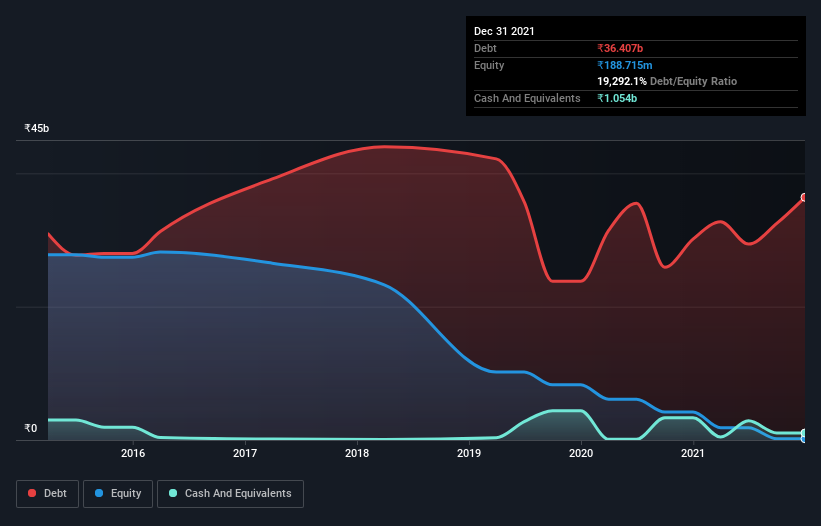- India
- /
- Real Estate
- /
- NSEI:PARSVNATH
Parsvnath Developers (NSE:PARSVNATH) Seems To Be Using A Lot Of Debt
Legendary fund manager Li Lu (who Charlie Munger backed) once said, 'The biggest investment risk is not the volatility of prices, but whether you will suffer a permanent loss of capital.' It's only natural to consider a company's balance sheet when you examine how risky it is, since debt is often involved when a business collapses. We note that Parsvnath Developers Limited (NSE:PARSVNATH) does have debt on its balance sheet. But is this debt a concern to shareholders?
What Risk Does Debt Bring?
Debt assists a business until the business has trouble paying it off, either with new capital or with free cash flow. Ultimately, if the company can't fulfill its legal obligations to repay debt, shareholders could walk away with nothing. While that is not too common, we often do see indebted companies permanently diluting shareholders because lenders force them to raise capital at a distressed price. Of course, debt can be an important tool in businesses, particularly capital heavy businesses. The first thing to do when considering how much debt a business uses is to look at its cash and debt together.
View our latest analysis for Parsvnath Developers
What Is Parsvnath Developers's Net Debt?
You can click the graphic below for the historical numbers, but it shows that as of September 2021 Parsvnath Developers had ₹36.4b of debt, an increase on ₹30.1b, over one year. On the flip side, it has ₹1.05b in cash leading to net debt of about ₹35.4b.

A Look At Parsvnath Developers' Liabilities
According to the last reported balance sheet, Parsvnath Developers had liabilities of ₹52.0b due within 12 months, and liabilities of ₹26.0b due beyond 12 months. Offsetting these obligations, it had cash of ₹1.05b as well as receivables valued at ₹2.91b due within 12 months. So its liabilities total ₹74.1b more than the combination of its cash and short-term receivables.
This deficit casts a shadow over the ₹7.18b company, like a colossus towering over mere mortals. So we definitely think shareholders need to watch this one closely. At the end of the day, Parsvnath Developers would probably need a major re-capitalization if its creditors were to demand repayment.
We measure a company's debt load relative to its earnings power by looking at its net debt divided by its earnings before interest, tax, depreciation, and amortization (EBITDA) and by calculating how easily its earnings before interest and tax (EBIT) cover its interest expense (interest cover). Thus we consider debt relative to earnings both with and without depreciation and amortization expenses.
Weak interest cover of 0.11 times and a disturbingly high net debt to EBITDA ratio of 54.6 hit our confidence in Parsvnath Developers like a one-two punch to the gut. This means we'd consider it to have a heavy debt load. Even worse, Parsvnath Developers saw its EBIT tank 26% over the last 12 months. If earnings keep going like that over the long term, it has a snowball's chance in hell of paying off that debt. There's no doubt that we learn most about debt from the balance sheet. But you can't view debt in total isolation; since Parsvnath Developers will need earnings to service that debt. So when considering debt, it's definitely worth looking at the earnings trend. Click here for an interactive snapshot.
Finally, while the tax-man may adore accounting profits, lenders only accept cold hard cash. So we clearly need to look at whether that EBIT is leading to corresponding free cash flow. Over the last two years, Parsvnath Developers actually produced more free cash flow than EBIT. That sort of strong cash generation warms our hearts like a puppy in a bumblebee suit.
Our View
To be frank both Parsvnath Developers's EBIT growth rate and its track record of staying on top of its total liabilities make us rather uncomfortable with its debt levels. But on the bright side, its conversion of EBIT to free cash flow is a good sign, and makes us more optimistic. Taking into account all the aforementioned factors, it looks like Parsvnath Developers has too much debt. That sort of riskiness is ok for some, but it certainly doesn't float our boat. The balance sheet is clearly the area to focus on when you are analysing debt. But ultimately, every company can contain risks that exist outside of the balance sheet. For example Parsvnath Developers has 3 warning signs (and 1 which is significant) we think you should know about.
Of course, if you're the type of investor who prefers buying stocks without the burden of debt, then don't hesitate to discover our exclusive list of net cash growth stocks, today.
New: Manage All Your Stock Portfolios in One Place
We've created the ultimate portfolio companion for stock investors, and it's free.
• Connect an unlimited number of Portfolios and see your total in one currency
• Be alerted to new Warning Signs or Risks via email or mobile
• Track the Fair Value of your stocks
Have feedback on this article? Concerned about the content? Get in touch with us directly. Alternatively, email editorial-team (at) simplywallst.com.
This article by Simply Wall St is general in nature. We provide commentary based on historical data and analyst forecasts only using an unbiased methodology and our articles are not intended to be financial advice. It does not constitute a recommendation to buy or sell any stock, and does not take account of your objectives, or your financial situation. We aim to bring you long-term focused analysis driven by fundamental data. Note that our analysis may not factor in the latest price-sensitive company announcements or qualitative material. Simply Wall St has no position in any stocks mentioned.
About NSEI:PARSVNATH
Parsvnath Developers
Engages in the real estate development business in India.
Moderate risk and slightly overvalued.
Similar Companies
Market Insights
Community Narratives



